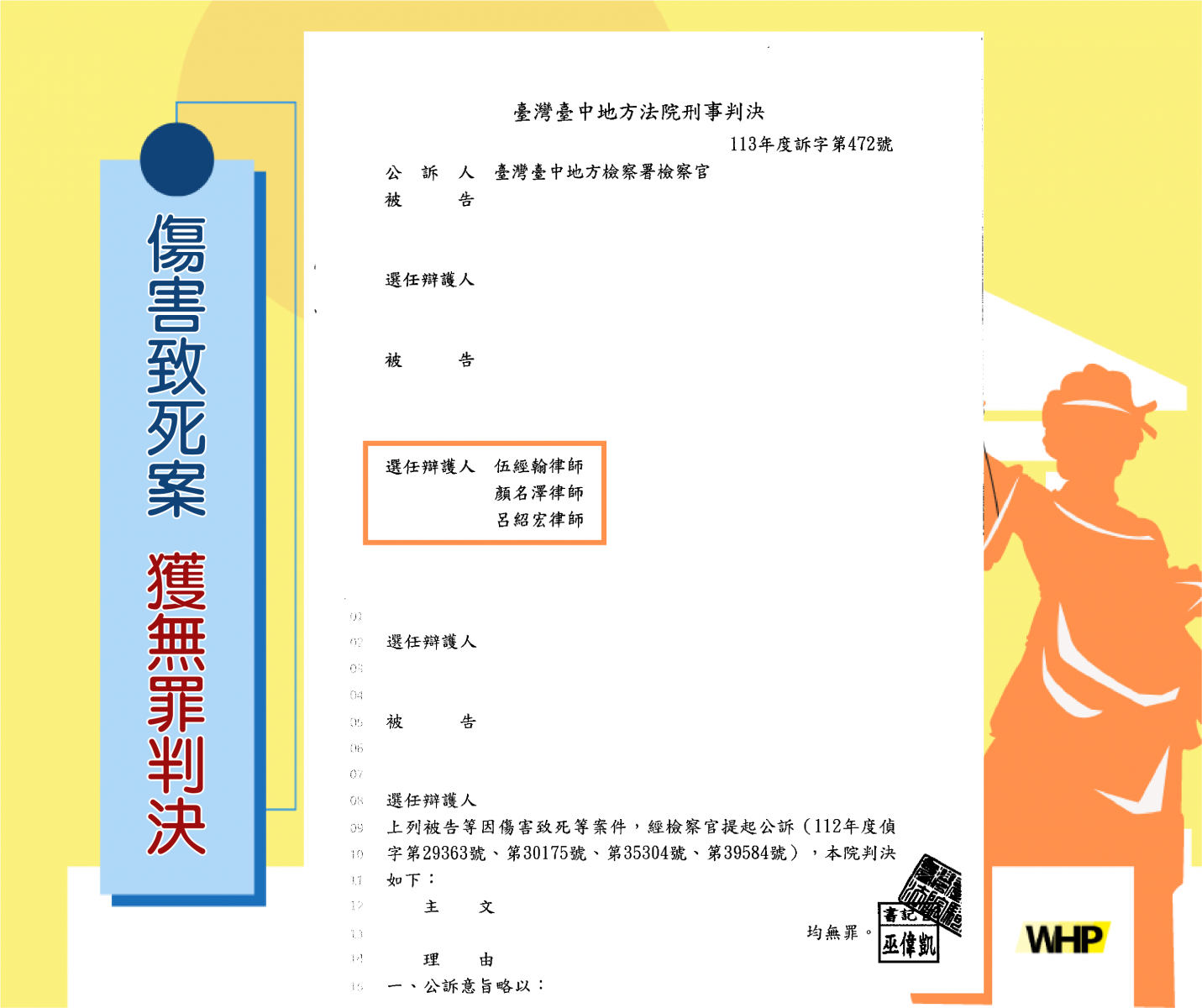首頁 >
| Involuntary Manslaughter | Defendant Accused of Involuntary Manslaughter

Relevant Legal Provisions
| Those who cause another’s death through negligence shall be punished by imprisonment of up to five years, detention, or a fine of up to 500,000 NTD. | |
| Those who harm another’s body or health shall be punished by imprisonment of up to five years, detention, or a fine of up to 500,000 NTD. Those who commit the aforementioned offense and thereby cause death shall be punished by life imprisonment or imprisonment of no less than seven years; if it causes serious injury, imprisonment of no less than three years and no more than ten years shall apply. |
Facts and Reasons
Six defendants (one of whom is our firm's client) and the victim lived together at the location of the case. Four defendants left the location between 8:00 and 9:00 a.m. Defendant A, at approximately 11:00 a.m. on the same day, rode a regular heavy motorcycle to dispose of a green plastic bag containing the victim’s clothes at a second-hand clothing collection box near a certain intersection. Defendant A then sought an uninformed locksmith to open the door of the victim’s room on the fifth floor of the premises. At noon on the same day, emergency services were called to the scene. Despite being transported to the hospital, the victim, who exhibited multiple bruises on the body, had no spontaneous breathing, blood pressure, or heartbeat upon arrival. The victim was pronounced dead at 12:56 p.m. the same day due to rhabdomyolysis leading to multiple organ failure.
Judgment
The victim was previously criticized for delays in planning activities, and during discussions, may have spoken directly or in an unfriendly tone. However, with the assistance of defendants A and B, the event concluded successfully, making it implausible to imagine any subsequent need for accountability. The prosecution’s claim that the six defendants injured the victim out of dissatisfaction with the victim's progress in planning a religious activity lacks substantial supporting evidence.
Evidence showed that defendants A, B, and C performed therapeutic tapping on the victim’s body with a scraping board, which may have caused redness, swelling, and other visible effects, but these were consistent with the results of therapeutic practices. There was no subjective intent to intentionally harm the victim. As such, the actions described cannot be judged as criminal injury.
After thoroughly examining the prosecutor’s evidence, the court found no undeniable proof beyond reasonable doubt of the defendants' subjective intent to commit involuntary manslaughter or abandonment. Under the principle of presumption of innocence and strict evidentiary standards in criminal law, it was determined that the prosecution could not substantiate the defendants’ guilt. Therefore, the court ruled in favor of acquittal for all six defendants.
images have been redacted and modified. For a full review of the case, please refer to theJudicial Yuan's judgment database)
Attorneys:Herman Lyu、Ian Yan、Timothy Wu
-
03.25 2025
Successful acquittal of lawyer's dummy account def...
-
03.18 2025
Divorce | Claim for Distribution of Remaining Prop...
-
03.11 2025
Criminal Second Instance | Report of Winning a Law...
-
02.25 2025
Civil | Second-instance case of demolition and lan...
-
02.18 2025
Car Accident | Volunteer Traffic Officer Hit by Ca...
-
02.11 2025
Car Accident | Our Lawyer Successfully Assisted th...
-
02.04 2025
Traffic Accident | Lawsuit for Serious Injury Succ...
-
01.21 2025
Fraud | Dummy Account Defendant Successfully Obtai...
-
01.14 2025
Criminal and Civil | Our Lawyer Successfully Helpe...
-
01.07 2025
Obstruction of Sexual Autonomy | Accused of Taking...
-
12.31 2024
Civil Case | Claim for Compensation Adjustment, Vi...
-
12.24 2024
Defamation | Uploading Photos to a Gossip Forum Le...
-
12.17 2024
Civil Case | False Claims in Assignment of Debt: V...
-
12.10 2024
Sexual Harassment | Defendant Not Prosecuted for S...
-
12.03 2024
Breach of Trust | Defendant Successfully Acquitted...